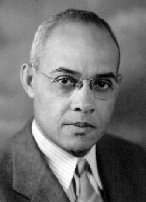


During Davis' tenure, the school became one of the leading black colleges in the country in both academics and athletics. He enacted major changes to the campus in his first ten years. Some of the top educators in the nation chose to teach at Institute, in large part due to Davis' influence. In 1927, West Virginia Collegiate Institute became the first all-black school in the nation to be accredited by the North Central Association of College and Secondary Schools. Davis later became the first African-American member of the Committee on Institutions of Higher Education of the same organization. In 1929, the school's name was changed to West Virginia State College and began conferring college degrees. The school also became home to several public institutions including the home for deaf and blind African Americans and the black agricultural extension program. Davis helped establish thestate's black 4-H camp at Clifftop, Fayette County, in 1942.
On September 11, 1939, Davis received approval from the Civilian Aeronautics Authority in Washington, D.C., to establish a Civilian Pilot Training Program at the college, the first African-American college in the country to do so. In the summer of 1940, West Virginia State College became the first black college to enroll white trainees into their flight program, a precedent for integrating the military. Among those enrolled were George Spencer Roberts, who became the first African American appointed to the United States Army Air Corps. The program produced another first. Rose Agnes Rolls of Fairmont became the first black woman solo pilot in the national program.
By the late thirties, Davis was becoming more involved in national civil rights activites. In 1939, he was elected to serve on the Board of Directorsof the NAACP Legal Defense and Educational Fund, two days after its inception. He resigned as president of West Virginia State in 1953 and left the state to become the fund's director of education. He was still working as a consultant for the fund at the time of his death on July 12, 1980, in Englewood, New Jersey.